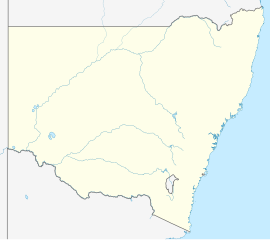Wooyung
Wooyung is a small town located in the Northern Rivers Region of New South Wales. The most recent census indicated a population of 139, with a median age of 49.[1] Wooyung means 'slow' in the local Bundjalung language, and is believed to reflect the natural tranquility of the area.[2]
History
[edit]The owners of the Wooyung area were the Bundjalung people, who built a Bora ring from the wetlands to perform traditional ceremonies and partake in the bounty of nature. The name is an Aboriginal expression, which literally means slow.
In the 19th century, European settlers arrived at Wooyung.
On 6 May 1849, the Swift, en route from Brisbane to Sydney was encountered by a fierce cyclone, which forced the schooner to capsize and cast ashore near Wooyung. Two timber-getting pioneers, John Boyd and Steve King, released the ship's skipper Captain Robb and a passenger who were trapped inside an air pocket. To this day, Captain Robb's descendants still live in the town.
In 1919, a little wooden school was built on the site of a red-brick building which still stands.
In 1935, prospectors looked for gold on Wooyung Beach. Its traces of black mineral sands, rutile and zircon can still be seen in the crumbly black rocks.
Today, Wooyung is a small residential area and lies within part of its nature reserve. Since then, it has not lost its attraction as a range to visitors, including surfers, birdwatchers and fishermen.
Wooyung Nature Reserve
[edit]In March 1999, the Wooyung Nature Reserve was established, a protected area of 87 hectares, in the north of the Wooyung locality.[2] The Reserve contains littoral rainforest and borders on the beach.[2]
Development controversy
[edit]In 2006, Tweed Shire Council administrator Lucy Turnbull approved a plan for a controversial $240 million resort at Wooyung,[3] despite there being alleged legal, cultural, environmental and community concerns with the proposed development.[4] As of 2019, funding for the project had still yet to be settled.[5]
Current usage
[edit]Wooyung is currently home to the Wooyung Beach Holiday Park, described in the official NSW Tourist website as "one of the few remaining bush camping sites on the east coast".[6]
Demographics
[edit]As of the 2021 Australian census, 139 people resided in Wooyung,[1] up from 118 in the 2016 census.[7] The median age of persons in Wooyung was 49 years. There were more males than females, with 51.8% of the population male and 48.2% female. The average household size was 2.5 people per household.[1]
Tourism
[edit]Wooyung lies along a stretch of uncrowded beaches that lack in beach patrol.
References
[edit]- ^ a b c d Australian Bureau of Statistics (28 June 2022). "Wooyung (State Suburb)". 2021 Census QuickStats. Retrieved 21 June 2023.
- ^ a b c "Wooyung Nature Reserve". NSW National Parks. Retrieved 13 May 2024.
- ^ Peter Caton 'Woyung resort to go ahead'. Tweed Daily News. 30 October 2006
- ^ Wooyung Defenders website; http://wooyungdefenders.com/. Accessed 10 January 2020. Sees also ICAC. 1990. Report into North Coast Development. Sydney: Independent Commission against Corruption, especially 'Chapter 17. The Woyung Project - Ocean Lakes'. pp.305-332.
- ^ BNA. 'Partners sought for $240 million development'. Business News Australia. 30 November 2019.
- ^ Visit NSW website, https://www.visitnsw.com/destinations/north-coast/the-tweed-area/accommodation/wooyung-beach-holiday-park. Accessed 6 January 2020.
- ^ Australian Bureau of Statistics (27 June 2017). "Wooyung (State Suburb)". 2016 Census QuickStats. Retrieved 8 August 2017.
